- info@wildlifeanimalcontrol.com
Call us for help in your town
Wildlife Control Education
Raccoons - How To Trap
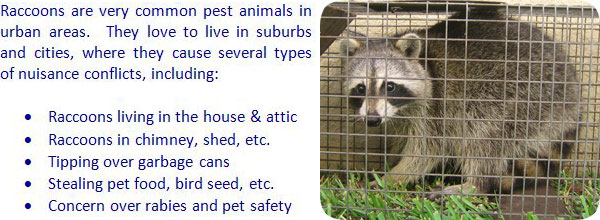
Need raccoon removal in your hometown? We service over 500 USA locations! Click here to hire us in your town and check prices - updated for year 2020.

How to Trap a Raccoon
Raccoons may appear to be cute and cuddly
animals that couldn’t harm anyone, but those who
have experienced an infestation of the animals
in or around their home will know differently.
Raccoons are not only a pest in terms of the
damage they can do, but they are also known to
carry diseases that can be dangerous to people
and domestic pets. This is not to vilify the
raccoon because they are simply animals trying
to survive, but their success in surviving in a
human environment is one which has meant the
species has continued to grow.
Choosing The Right Trap To Catch A Raccoon
One of the most important things in any attempt
to trap a raccoon will be to make sure you use
the right trapping equipment. There are a number
of traps that will be effective in catching a
raccoon, but it is important to consider the
type of trap you are using and whether or not it
can harm or affect other animals.
For those who do use a lethal trap, the most
common type will be the body trap which will
catch the raccoon under a metal bar and can
crush the animal or choke it if the bar snaps
across the neck. Although these are not widely
used there are still some wildlife management
companies and individuals that will use this
kind of trap. The problem with lethal traps is
that they can lead to a lingering death for the
animal if it catches the raccoon on the wrong
part of the body, and also leaves you the
problem of a carcass to deal with. Another
problem is that they can catch the wrong
animals.
The other option is the live trap, and the most
popular is the cage trap which will be baited
with food that will be most attractive to a
raccoon. The animal will wander in to the cage
to gain access to the food, but will then find
that they can no longer get out of the cage. All
live traps will need to be checked regularly, at
least once every 24 hours to see if it has
caught an animal so that you can minimize the
distress and suffering for the raccoon. There
are also traps that will catch the paws of the
animal, but the use of this type is reducing,
and is generally used by those hunting for fur
or people who have had such traps for a long
time.
Click below photos
for raccoon removal examples by the pros:
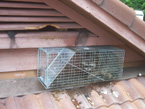 |
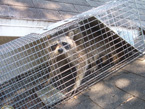 |
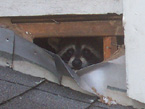 |
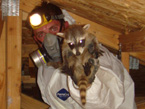 |
Baiting And Locating Your Trap
One of the toughest things for anyone who is trying to bait a trap to catch a raccoon is choosing the bait. It is best to avoid using meat, as this is bait that will attract many different species. There are some commercially available raccoon baits which have been developed to attract raccoons, but many people have had great success using a trap baited with marshmallows. Read more about What Bait To Use For Raccoon Traps here. Choosing the right spot to place the trap will also be very important, and the key location will be one that the raccoon uses regularly but won’t catch other animals. If they are in your attic or basement locating this at the entrance will be a good place to start, as are any holes in or under your fence that the raccoon uses to access your yard.
Handling And Removing The Raccoon
Because raccoons are known for carrying a number of diseases, and for the reason that they are likely to be aggressive or disorientated by being trapped, it is best to keep handling of the raccoon to an absolute minimum.
Some states will have regulations about relocating the animal and will insist that it is taken to an official location to be relocated or euthanized. It is best to take the animal at least ten miles away before releasing it, as raccoons will often return to their nest.
More in-detail how-to raccoon removal articles:
Information about how to kill a raccoon - with poison or other methods.
Information about how to keep raccoons away - prevention techniques.
Information about how to catch a raccoon - remove one stuck in the house.
Information about raccoon repellent - analysis of types and effectiveness.
Read more about raccoons in my educational articles. Learn if raccoons attack or are dangerous to cats, dogs, or other pets. Read if you should feed a baby raccoon and what to do if you are bitten by a raccoon. Find out if repellents will keep raccoons out of your chimney, if raccoons can climb fences, and the kind of damage raccoons can do in an attic. Learn why raccons Die Inside Houses, why they burrow and dig holes, and what diseases raccoons carry. Read more about whether or not raccoons can open doors or windows, if raccoons eat rats or mice, and what is raccoon roundworm. I can show you what to do about a raccoon under the porch, and how to identify raccoon tracks. Learn if raccoons a href="raccoontree.html">live or sleep in trees and what equipment is needed to trap a raccoon. I can even let you know if it is legal for you to trap a raccoon.
Learn whether or not raccoons swim, how smart they are, if raccoons hibernate, if they can jump, and some of the symptoms of a sick raccoon. Learn why raccoons tear up sod and if the city or county animal services will help with a raccoon issue. I can let you know where you should relocate a trapped raccoon, what wildlife rehabilitators do with raccoons, and how to keep raccoons out from under your porch.
This site is intended to provide raccoon education about how to trap a raccoon in your house or property and and information about raccoon trapping, so that you can make an informed decision if you need to deal with a raccoon problem. This site provides many raccoon control articles and strategies, if you wish to attempt to solve the problem yourself. If you are unable to do so, which is likely with many cases of raccoon removal, please go to the home page and click the USA map, where I have wildlife removal experts listed in over 500 cites and towns, who can properly help you with your nuisance raccoon.
Click here to read more about how to get rid of raccoons.

















